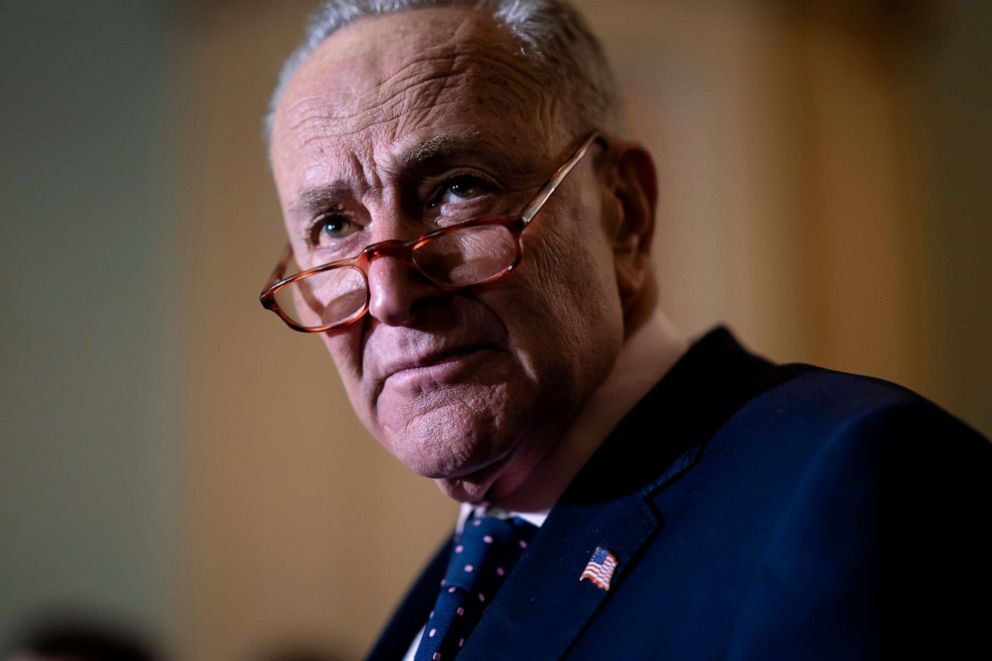参议院高级谈判代表表示,在国会休会两周之前,他们即将达成一项协议,批准100亿美元的额外COVID救援资金。
预计参议院最早将于下周审议该法案。
在重新努力通过额外资金来应对疫情冠状病毒之前,谈判代表在3月早些时候被迫从政府支出计划中取消了156亿美元的援助,原因是在如何支付该法案上存在分歧。
在参议院多数党领袖舒默(Chuck Schumer)和共和党参议员罗姆尼(Mitt Romney)领导下,经过几天的两党谈判,罗姆尼周四告诉记者,议员们已经“就所有支出和所有抵消达成了原则协议”
罗姆尼表示,100亿美元的一揽子计划将“通过抵消完全平衡”
然而,罗姆尼警告说,该法案可能不到民主党游说的50亿美元,用于全球疫苗接种工作。他说,在共和党人加入之前,该法案还需要由国会预算办公室进行评估。
乔·拜登总统周三恳求国会迅速采取行动。
“国会,请行动吧。你必须立即行动。无所作为的后果是严重的。它们只会随着时间而增长。但不一定非要这样。我们已经证明了当我们一起工作时我们能做什么。因此,我敦促民主党人和共和党人尽快完成这项工作,”拜登周三在白宫表示。
在参议院,舒默吹捧参议院最近几天为批准额外资金所做的两党合作。
“差距已经大大缩小,我们决心与共和党人合作,跨越终点线,因为这对于我们的国家至关重要,如果,上帝保佑,未来出现新的变种,那太有可能了。我们希望获得比我们的共和党同事多得多的资金,但我们需要达到60票才能在参议院通过,所以我们将尽最大努力,”舒默周四在一次发言中说。
“我们将继续努力达成一项真诚的协议,我们希望我们的共和党同事最终与我们一起支持一个足够强大的一揽子计划来解决这个问题,”他补充说。“正如我所说的,我们正在取得良好的进展。我们越来越接近了,但我们越早达成协议,对这个国家就越好。”
几个月来,共和党人一直坚持认为,任何额外的COVID救济资金都必须来自国会在2020年和2021年批准的未使用的疫情救济资金。
100亿美元的最高限额大大低于拜登政府最初要求的220多亿美元,也低于3月早些时候国会即将批准的156亿美元。

J.斯科特·阿普尔怀特/美联社
参议院多数党领袖查克·舒默在华盛顿国会大厦会见记者.
当时,众议院民主党人反对共和党人的一项提议,即该法案的部分内容将由地方和州政府的资金支付。
共和党参议员表示,新的援助计划不会从这些资金中抵消,因此预计民主党人将接受较小的价格,尽管一些成员已经对国际卫生努力缺乏资金表示担忧。
周四早些时候,众议院议长南希·佩洛西抨击共和党削减救援资金。
“我认为共和党人正在做的是,要么他们不关心,要么他们不知道。但这是错误的,”佩洛西在新闻发布会上告诉记者。
“我们甚至需要更多的钱,”她补充道。
“这是可耻的。我们必须拿到钱。这可能不会持续到6月1日。所以,对他们来说,我的意思是,他们发表声明说这不是,我们不认为这是一个问题。这是个问题。这是一种耻辱,”佩洛西说。
关键谈判者共和党参议员罗伊·布朗特(Roy Blunt)周四告诉记者,新资金的一半将用于治疗。另一半将分配给卫生与公众服务部,由他们“自行决定”如何用于以COVID为中心的需求,如研究。
布朗特说,该法案预计将通过收回22亿美元的拨款来支付,这笔拨款用于关闭表演艺术场所,包括“动物园和剧院”。该法案还将重新规划原本用于航空制造业的20多亿美元。
截至周四,立法文本尚未出台。
“协议尚未完成,”关键谈判代表、共和党全国委员会参议员理查德·伯尔(Richard Burr)说,他补充说,谈判代表仍在敲定细节。
当被问及是否达成协议时,参议院少数党领袖米奇·麦康奈尔(Mitch McConnell)回应道:“我们正在努力。我们会成功的。”
多名共和党参议员表示,他们乐观地认为,该协议将获得必要的共和党支持,以满足参议院所需的60票门槛。
但是时间是最重要的。
参议院将在下周的大部分时间里对最高法院提名法官凯坦吉·布朗·杰克逊进行确认,预计她将被确认为美国历史上第一位黑人女性法官。
Senators close in on $10 billion COVID relief deal
Top Senate negotiators have said they are close to striking a deal to approve $10 billion in additional COVID relief funding with just a handful of days remaining before Congress heads off for a two-week recess.
The Senate is expected to consider the legislation as soon as next week.
The renewed effort to pass additional funding to address the coronavirus pandemic comes after negotiators were forced to strip $15.6 billion in aid from a government spending package earlier in March over disagreements about how the bill would be paid for.
After days of bipartisan negotiations led by Senate Majority Leader Chuck Schumer and Republican Sen. Mitt Romney, Romney told reporters Thursday that lawmakers had reached "an agreement in principle on all of the spending and all of the offsets."
Romney said the $10 billion package would be "entirely balanced by offsets."
The bill, however, would likely contain less than the $5 billion Democrats have lobbied to go toward the global vaccination effort, Romney cautioned. He said the bill would also still need to be scored by the Congressional Budget Office before Republicans get on board.
President Joe Biden on Wednesday implored Congress to act switfly.
"Congress, please act. You have to act immediately. The consequences of inaction are severe. They'll only grow with time. But it doesn't have to be that way. We have proven what we can do when we work together. So I urge Democrats and Republicans to get this done with urgency,” Biden said from the White House Wednesday.
On the Senate floor, Schumer touted the bipartisan work the Senate has undertaken in recent days to approve the additional funding.
"The gap has been narrowed greatly and we are intent on working with Republicans to cross the finish line because this is vital for our country if, God forbid, a new variant arises in the future, and that's all too likely. We would like considerably more money than our Republican colleagues, but we need to reach 60 votes to get something passed through the Senate and so we are going to push as hard as we can," Schumer said in a floor speech Thursday.
"We will keep working to arrive at a deal in good faith, and we hope our Republican colleagues ultimately join us in supporting a robust enough package to deal with this problem," he added. "As I said, we're making good progress. We're getting closer and closer, but the sooner we get this deal done, the better for the country."
Republicans have insisted for months that any additional COVID relief funding would have to come out of unused pandemic relief money that Congress approved back in 2020 and 2021.
The $10 billion top line number is significantly less than the more than $22 billion the Biden administration initially requested and less than the $15.6 billion Congress was on the cusp of approving earlier in March.
At the time, House Democrats revolted over a proposal from Republicans that parts of the bill would be paid for by funds meant for local and state governments.
Republican senators have said the new aid package would not be offset from these funds, so Democrats are expected to swallow the smaller price tag, though there are already concerns from some members over the lack of funding for international health efforts.
Earlier Thursday, House Speaker Nancy Pelosi slammed Republicans for whittling down the relief aid.
"I think what the Republicans are doing is, either they don't care, or they don't know. But it is wrong," Pelosi told reporters during a press conference.
"We're going to even need more money," she added.
"This is shameful. We have to get the money. It's not going to last us past probably June 1. So, for them to just, I mean, they're making statements saying this is not, we don't see this as a problem. It's a problem. It's a shame," Pelosi said.
Half of the new funds will be used for therapeutics, Republican Sen. Roy Blunt, a key negotiator, told reporters Thursday. The other half would be distributed to the Department of Health and Human Services for use with "broad discretion" as to how it will be spent on COVID-centric needs like research.
Blunt said that among the ways the bill is expected to be paid for is by clawing back $2.2 billion appropriated for shuttered performing arts venues, including "zoos and theaters." The bill would also reprogram more than $2 billion originally intended for aviation manufacturing.
As of Thursday, no legislative text had been written.
"The agreement's not done yet," said Sen Richard Burr, R-N.C., a key negotiator, adding that negotiators are still finalizing details.
Senate Minority Leader Mitch McConnell, when asked if there was a deal, responded: "We're working on it. We'll get there."
Multiple Republican senators have said they are optimistic the deal will get the necessary Republican support to meet the necessary 60-vote threshold in the Senate.
But time is of the essence.
The Senate will spend a majority of next week's floor time on the confirmation process for Supreme Court nominee Judge Ketanji Brown Jackson, who is expected to be confirmed as the first Black woman justice in the nation's history.






